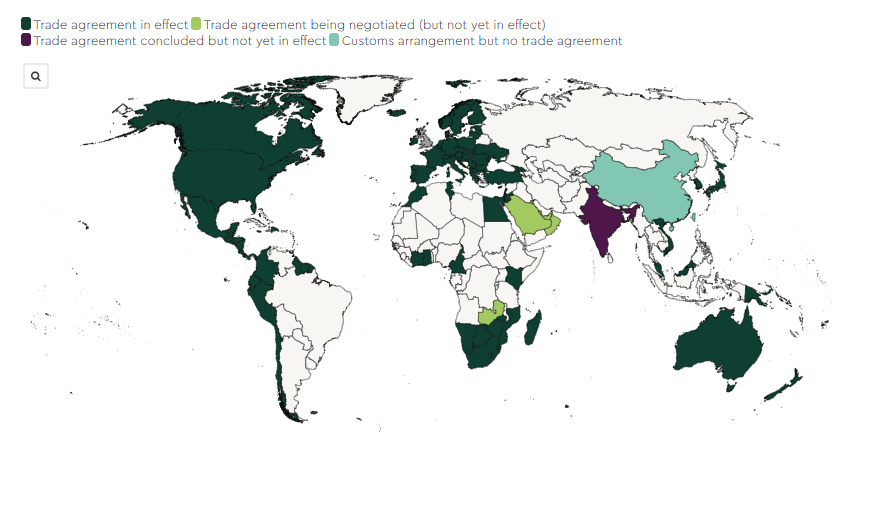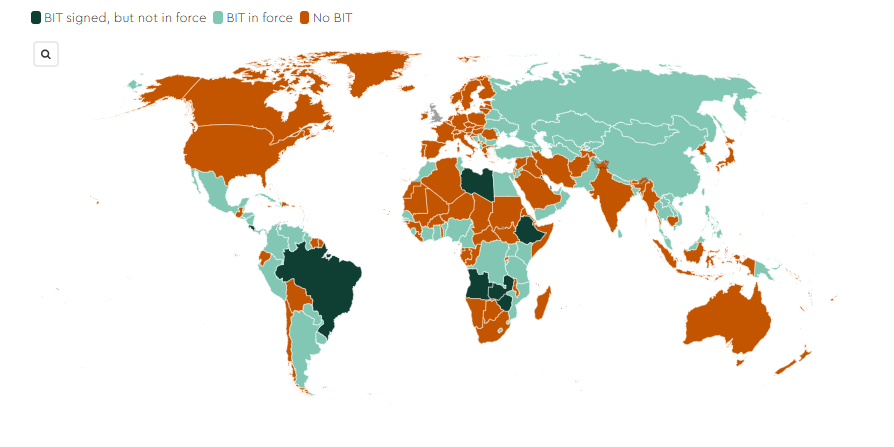- within International Law topic(s)
- with Senior Company Executives, HR and Finance and Tax Executives
- in Australia
- with readers working within the Retail & Leisure industries
1 Free trade agreements
The UK currently has free trade agreements in force with over 60 countries and is in the process of negotiating new trade agreements with a number of other territories. See the notes below for further explanation relating to this interactive map. The map allows you to zoom in on a particular geographic area. You can also look up a particular country by using the search box at the top left of the map.
Notes on the interactive map
When you click on a country with which the UK either has a free trade agreement or is in negotiations to conclude one, you can access additional information about that country as follows:
- Status: "Full ratification" means
that the trade agreement has been fully ratified by the relevant
state legislature(s). "Provisional application" means
that although full ratification has yet to take place, the
agreement is being applied on a provisional basis (and therefore
businesses can benefit from it, notwithstanding the lack of formal
ratification). "Agreed in principle" means that whilst
negotiations are at an advanced stage and a formal agreement is
more likely than not, it has yet to be signed and is not yet in
force. "In negotiations" means that talks have commenced
– see the "Additional notes" field for updates on
progress.
- Type: "Continuity trade agreement"
means an agreement which is largely based on a trade agreement
originally put in place by the EU, from which the UK could benefit
as an EU Member State. These agreements account for the majority of
the UK's current network of free trade agreements. "New
post-Brexit UK-specific deal" means an agreement which does
not necessarily follow the same template as the "continuity
trade agreements" (which were based on the EU's drafting).
At the time of updating, the only such agreement in force was
between the UK and Japan – but others are in the process of
being negotiated or implemented (see below under the heading
"New trade agreements").
- Mutual recognition of product conformity?:
Some trade agreements provide for countries to recognise each
other's processes for testing certain products, particularly as
regards safety issues. In practical terms, this means that tests to
demonstrate compliance with the regulations of the country of
import can in some cases be carried out by approved testing bodies
in the country where the exporter is based and may not have to be
repeated by equivalent bodies in the country of import. In some
cases (e.g. the US), such arrangements exist in the form of a standalone agreement, independent of any free
trade agreement. However, such mutual recognition arrangements are
often confined to a limited range of goods (see, for example, the
US-UK agreement noted above) and it should not be assumed that all
products are covered.
- Customs cooperation?: Some trade agreements provide for countries to cooperate on customs matters, with a view to easing border red tape. In some cases (e.g. China), such arrangements exist in the form of a standalone agreement, independent of any free trade agreement.
New trade agreements
On 30 June 2025, the first part of the new UK-US trade deal came into force, although negotiations are ongoing as to the other aspects of the deal such as plans to exempt the UK exempt from the 25% US tariff on steel imports. The UK has also reached agreement with India on the terms of their trade agreement, which is now awaiting ratification. The map indicates a number of other countries with which the UK is in the process of negotiating entirely new trade agreements (coloured light green) – these include the countries of the Gulf Cooperation Council (Bahrain, Kuwait, Oman, Qatar, Saudi Arabia and the United Arab Emirates).
The UK still seems to be looking to expand its existing continuity trade agreements with Turkey, Canada, Israel, Mexico, South Korea and Switzerland (these countries are coloured dark green because there is already a trade agreement in place with the UK; the negotiations are aimed at improving and updating such arrangements). Finally, the UK has negotiated and entered into digital trade agreements with a number of territories including Singapore and Ukraine – these typically supplement the existing trade arrangements.
CPTPP membership
In December 2024, the UK Government acceded to the Comprehensive and Progressive Agreement for Trans-Pacific Partnership (CPTPP). This means UK businesses can now benefit from the terms of the CPTPP when trading with the following parties: Japan, Singapore, Chile, New Zealand, Vietnam, Peru, Malaysia, Brunei and Australia. Canada and Mexico have not yet ratified the UK's accession to CPTPP; UK businesses will not be able to trade with these parties under CPTPP until 60 days after ratification has taken place. However, the UK already has bilateral post-Brexit continuity trade agreements in place with both Canada and Mexico.
The UK's accession has taken the total membership of the group to 12 states. The problem with displaying these on the map is that the UK already has bilateral trade agreements with 9 of the CPTPP's current members (Australia, Canada, Chile, Japan, Mexico, New Zealand, Peru, Singapore and Vietnam). For these countries, CPTPP membership is not indicated through use of a different colour, but in the Additional Notes field for the relevant country. The only other current CPTPP members are Brunei Darussalam and Malaysia. As the UK does not have existing bilateral trade agreements with these 2 countries, we have changed the colour coding to dark green in order to reflect the impact of the UK acceding to the CPTPP.
PLEASE NOTE: This information provides a high-level overview of the UK's free trade agreements and related arrangements such as agreements on customs cooperation or mutual recognition of product conformity. This is neither to be relied on as legal advice, nor is it intended to be a comprehensive overview or description of the provisions of those agreements. If you need more information, please get in touch. Much of the information was obtained from the UK Government's guidance on UK trade agreements with non-EU countries and its trade and investment factsheets.
2 Bilateral investment treaties
Bilateral Investment Treaties or BITs give investors from the UK protection where they make an investment in the "host state" (i.e. the other party to the BIT) – and vice versa where the other party's investors make investments in the UK. In particular, they allow the investor to take action in their own right to protect their investment or obtain compensation (as opposed to having to ask their own government to raise the matter on a state-to-state basis). For more detail, see BITs and the post-Brexit investment landscape.
As highlighted by our interactive map, the UK has an extensive network of BITs. This makes it a potentially attractive jurisdiction for incorporating investment vehicles which can then be used to invest in countries with which the UK has concluded a BIT. However, the BIT must have been brought into force - and the actual terms of the relevant BIT should always be reviewed to ascertain the level of protection offered. Some of the countries with which the UK has BITs are very small, but the map allows you to zoom in on particular geographic areas. You can also look up a particular country by using the search box at the top left of the map.
PLEASE NOTE: This information provides a high-level overview of the UK's Bilateral Investment Treaties. This is neither to be relied on as legal advice, nor is it intended to be a comprehensive overview or description of the provisions of those agreements. If you need more information, please get in touch. The information on BIT status was obtained from the UNCTAD International Investment Agreements Navigator and UK Treaties Online.
Termination of BITs
Since we first published this interactive map in 2021, BITs between the UK and the following countries have been terminated: Indonesia, Latvia, Croatia, Chile, Romania, Estonia, Czech Republic, Slovakia, Hungary, Malta, Lithuania, Slovenia. With the exception of Indonesia, these are all EU Member States. The termination of these countries' BITs with the UK is most likely a result of the fact that trade relations between the EU and third countries (such as the UK) are an exclusive competence of the European Commission (many of these BITs predated the relevant countries' membership of the EU). More generally, BITs have become somewhat controversial because of the way that they enable private investors to enforce their rights against host countries through arbitration. This appears to account for Indonesia's decision to terminate its BITs with other countries, including the UK.
Relationship with trade agreements
If a country has not concluded a freestanding BIT with the UK, it may be worth exploring whether similar protection for investors is available via a trade agreement (see section 1 above). These often contain provisions on investment, which may in some cases extend to the type of protection normally available via a freestanding BIT.
The content of this article is intended to provide a general guide to the subject matter. Specialist advice should be sought about your specific circumstances.





